
In the world of professional valuation services we often hear the idiom that “you get what you pay for”. Usually the context behind this is “we offer three types of service”, namely:
- Credible and Reliable;
- Cheap; or
- Fast.
But you can only pick two:
- Credible and reliable and cheap will not be fast;
- Credible and reliable and fast will not be cheap; or
- Cheap and fast will not be credible and reliable.
At Suncorp Valuations we emphasize credible and reliable reporting that is completed on time and at a fair price, in accordance with our brand promise!
Those of you who use our services know that Suncorp always prepares and delivers a proposal which details our current understanding of the services to be conducted. We do this in order to establish the appraisal’s intended use, scope of service, our professional fee, and the required timing of our deliverables.
Recently, a new client to Suncorp advised us that they had obtained three independent proposals from suppliers who they thought were credible and reliable. In vetting these proposals, our client asked if we could help them better understand the variances between them and explain why our professional fee was the highest.
The first variance we identified was related to the “credible and reliable” premise:
Clearly two of the firms were proposing to utilize staff who had not obtained a designation from a recognized and regulated Appraisal Society. Each and every report that Suncorp Valuations prepares is reviewed and signed off on by one of our permanent, full-time appraisers, who have obtained an Accredited Senior Appraiser designation from one of the following recognized Appraisal Societies:
These designations have rigorous requirements with respect to formalized training and articling experience which must be adhered to before a Senior designation within each Society is granted.
The second variance we identified was related to the “on time” premise:
Our proposal was the only one that addressed the timing of the deliverables to align with the intended use of the report (i.e. to assist the insurance broker with the placement of property insurance). At Suncorp we want to be timely in our reporting to meet our client’s requirements; not fast, but appropriately timed!
The third variance we identified related to disclaimers within our competitor’s proposals:
These disclaimers limited the competitor’s liability in the event that their final cost estimates were not adequate to replace the property in the event of a significant loss.
Suncorp Valuations believes that by combining appropriate liability insurance along with proper appraisal accreditation, this affords our firm the ability to withstand scrutiny of our value conclusions. As a prudent company, having been in business for over 60 years , our professional fees need to reflect the cost of being able to provide both services. Accordingly, our professional fees are not always “the cheapest” option. We are happy to provide clients with a copy of our “Certificate of Insurance” which outlines the coverage we have in place to protect them, in the unlikely event that there is an error in our final cost estimate.
In selecting your valuation services provider, we encourage you to conduct an “apples to apples” comparison to ensure your interests are represented appropriately.
Be wary of companies that limit their liability to a multiple of the fees paid for the service, along with those who do not utilize staff members with Senior Appraiser designations from one of the above-noted recognized Appraisal Societies.
To sum things up, “cheap and fast” is not always the correct answer, and to quote a man who has a proven record of accomplishment in measuring risk:
“Price is what you pay; value is what you get.”
— Warren Buffett
In contending with COVID 19 and other events such as the West Coast wildfires, or flooding in the Southeast US, many of our clients are examining their fixed assets to develop strategies to maximize value and mitigate risk. In working with them in examining their fixed assets, we always start with “Intended Use”.
Fixed assets represent a significant portion of an enterprises asset base. Most organizations have reasonable estimates of the values or costs of their fixed assets but there are a variety of reasons why an organization may need an external third party valuation by an accredited firm. In this article, we cover seven of the main Intended Uses for fixed asset valuations.
Insurance Placement
Considering the increasing cost of insurance coverage, it is wise to obtain a Cost Estimate Report (insurance appraisal). This will assist with ensuring the coverage is adequate, and that you are not over insured. Whether an organization is renewing their current insurance policy or seeking a new insurance provider, they must provide an accurate statement of their insurable fixed assets. Although trended historical costs, internal estimates and supplier quotations may seem to be adequate, they often are not. A formal valuation of the organization’s insurable fixed assets is generally recommended every three (3) to five (5) years depending on the amount of construction material and labour cost changes over that period. In the interim years, Suncorp has developed a composite index with which we can provide desktop updates.
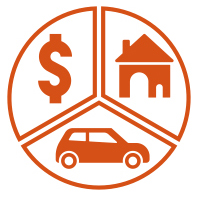
Financial Reporting
The need for an accurate statement of fixed asset values in Financial Statements may be driven by a number of circumstances from compliance to accounting standards to business combinations. For example, the Public Sector Accounting Board (PSAB) revised section PS 3150 of the CICA Public Sector Accounting Handbook: “Reporting of Tangible Capital Assets.” As a result, local governments are required to record capital expenditures as capital assets and amortize them over their useful life. The goal of this standard change was to render financial reports that are more current, accurate and comprehensible – hence more useful to legislators, oversight bodies, creditors and the general public. Another change in accounting was when IFRS replaced GAAP for publicly accountable enterprises and government business enterprises. For Property, Plant and Equipment, IAS 16 prescribes accounting treatment for PPE. Relative to business combinations, the recognition and measurement of acquired fixed assets can be challenging. IFRS 3 Business Combinations outlines the accounting when an acquirer obtains control of a business (e.g. an acquisition or merger). Such business combinations are accounted for using the ‘acquisition method’, which generally requires assets acquired and liabilities assumed to be measured at their fair values at the acquisition date.
Asset-Based Financing
Changing economic conditions, uncertain market changes, or shifts in collateral values can cause both lenders and borrowers to reconsider their financial position. In addition, asset-based lending is a key tool for business sustainability and growth when it comes to managing cash and opportunities for expansion. Valuations of the fixed assets are typically required on an Orderly or Forced Liquidation basis depending on the circumstances. Occasionally lenders may accept Fair Market Value-Continued Use as an appropriate premise if an organization’s earnings support the fixed asset valuation.
Asset Control and Management
For organizations both large and small, there is a need to monitor fixed assets in terms of their age, condition and expected dates of replacement. A formal inspection and inventory are typically part of fixed asset valuations. The detailed information provided in valuations can be used to assist internal staff with the development of a formal asset management plan or the need to hire additional consultants to complete formal condition assessment or other studies.

Multi-Use Valuations
Although each of the intended uses above were discussed independently, it is often more cost-effective to complete fixed valuations for multiple uses at the same time. This is because many of the same tasks such as inspections and inventories need to be completed regardless of the reason for the report. Additionally, values that are developed for one purpose (i.e. Reproduction Cost for insurance purposes) may be required to develop values for other purposes (i.e. Fair Market Value for purchase price allocation).
In conclusion, given the wide variety of uses it is important in requesting a fixed asset valuation to clearly communicate what the intended use of the valuation is and to also advise if there are any secondary purposes that may be able to be incorporated into the valuation service provided. This will ensure that you receive the correct valuation for your use and users.
Contact Suncorp today for all your valuations needs.
As an essential service supporting insurance, finance, accounting and litigation we have continued to work with our clients to mitigate the risk of COVID 19 for our appraisal and risk management teams in conducting inspections. Ergo, we have been able to advance appraisal and risk management engagements so our client’s applications for insurance, financing, or other purposes can proceed without delay.
As we have been planning our engagements, we are contending with travel restrictions which have forced us to look at travel routes and strategic use of our staffing. As we did this, we started at looking at all the countries we have been pleased to work in the last few years. As the map below depicts, we truly have a global reach and this continues today as we plan current assignments in countries such as Lithuania, Poland, Indonesia, Brazil, Mexico, Australia and all over North America.
Thanks to you, our valued clients, we have been pleased to expand our North American network of offices, while bringing on appraisers based in Europe and South America to better serve your needs. At this time we wanted to thank you for the continued trust in our services and appreciate your patience as we develop processes (such as conducting inspections at maintenance shutdowns or off peak hours) to keep your organization’s and our appraisal teams safe!
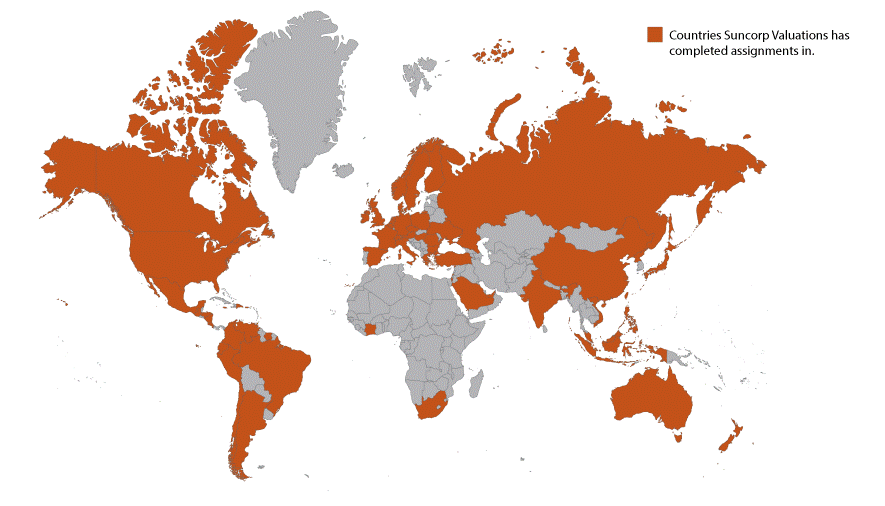

“A statement of values (SOV) is a report that an insured submits to an insurer. It details the amount each property that will be covered under a policy is worth. The insurer then bases the insured’s premium on this report.
To avoid underinsurance, the statement of values must be accurate and comprehensive. It must not only provide the amount for each property in every location but it must also list all the insurable items in each property, such as machinery and other equipment.
In order to ensure the accuracy and comprehensiveness of their statement of values, it is advised that the insured get the assistance of a finance professional, such as a property insurance broker, when drafting their SOV.” (1)
When you accept your statement of values, it is your declaration to the insurance brokerage and the insurance company that the composition and valuation of the property contained is accurate. How do you know if the numbers are accurate and what are the consequences if they are not?
First, let us explore where these numbers may have come from. Have you recently had a professional valuation completed by an accredited firm? If so, you can jump to the next paragraph. Did your numbers come from a dated valuation or perhaps original cost and you have applied an inflationary index each year? If so, how did you come up with your index and how long have you been indexing these? Have you accounted for changes to property or machinery and equipment? Have you accounted for freight, installation and any other considerations in the replacement of your property? Without answers to these questions, you may be at risk of insuring your property with inaccurate values.
Next, what is the risk associated with the accuracy of these numbers? The best case scenario is to be accurately insured; you avoid both the over-payment of premium as well as the risk of co-insurance penalties (being under-insured). If you are over-insured, you are paying too much premium. In the event of a loss, you may not receive the excess insurance you placed and those premium dollars are lost. Even worse is the risk of being under-insured and facing a co-insurance penalty.
Co-insurance penalties would apply to policies with a co-insurance clause. A co-insurance clause is written into an insurance policy to spread the risk between parties. The most common co-insurance limit is 90%, which means a client is responsible to insure to 90% of the replacement cost of their property’s value. So for a building that has a replacement cost of $1,000,000 with a 90% co-insurance clause, the client must insure to a minimum of $900,000. The biggest concern to a client failing to meet the minimum co-insurance requirement is the co-insurance penalty.
This example will explain better:
Using the above example, the insured, selects an insurable limit of $750,000 based on historical records in their files (should be $900,000 due to 90% coinsurance clause). Policy has a $1,000 deductible. The building has a fire and there is a $250,000 loss. During the adjusting of the claim, the insurance company will see that the client did not meet the coinsurance requirement and invoke the coinsurance penalty.
The penalty is calculated as follows:
Amount insured to divided by amount should have insured to and multiplied by amount of loss due to claim = amount insurance policy will pay for claim.
$750,000 (insured) / $900,000 (should have insured) X $250,000 (loss) = $208,333 will be paid by insurance company.
The insured will be out of pocket over $40,000 (rather than just the $1000 deductible if they had insured to $900,000).
So what does it imply when you accept your statement of values and send them back to your broker? It means you are confident in the numbers and assume the financial risks of any inaccuracies in a loss scenario. If you are reviewing your statement of values, and do not know if you can trust your numbers, you should consult your broker to look at options to develop the right values.
Call Suncorp Today.
REFERENCES:
Statement of Value (SOV). Retrieved from https://www.insuranceopedia.com/definition/509/statement-of-values-sov-insurance

Learning Objective: To provide some suggestions on what to consider as part of your schools re-opening plans during and post the COVID-19 pandemic.
Many School Divisions are meeting to examine how they can safely re-open their schools now that the Governments and Provincial Health Authorities have given their approval. In discussions with many of you and information we’ve gathered from other areas throughout Canada and around the world, we thought it was timely to provide you some of the ideas being considered.
Ultimately, everyone wants to ensure our schools are safe for staff and students while at the same time providing an effective environment for students to learn. As such, balancing this will be the challenge that School Divisions will encounter as they navigate the various requirements.
Things to consider:
- Thorough cleaning of all schools prior to student’s arrival.
- Hand sanitizers located at all key entry points and common areas throughout school.
- Constant promotion of proper hand washing for all staff and students.
- Regular screening of students/staff for temperature, and COVID-19 related symptoms. If symptoms present, Isolate until such time as they can be picked up by a parent/care giver.
- Staggered arrival/departure times. Different grades starting and being dismissed at different times.
- Staff/students splitting their instructional days where a portion will be instructed in classrooms and a portion via home based learning.
- Implementing alternate days/weeks where students will attend school and learn from home.
- Smaller number of students on buses (supports the staggered start time’s scenario).
- Smaller number of students in classrooms to maintain required physical distancing of 2m.
- Process in place within hallways, stairs, and other common areas to ensure proper distancing is maintained, ie. one staircase designated for down only and one designated for students going up.
- More emphasis on distance learning. Some Divisions are considering certain grades will be taught through distance learning programs versus in schools. This will provide some relief on the challenges associated with classroom loads in many schools.
- Re-purposing single use rooms such as libraries, cafeterias, gyms into multi-purpose areas where lessons can take place.
- Using outdoor learning when weather & systems permit. Use of sports field surrounding schools as outdoor classrooms.
- Looking to rent alternate facilities to use for instruction.
- Redrawing of school boundaries to take advantage of underused facilities.
- Availability of applicable PPE for staff and/or student use.
- Removal/decommissioning water fountains.
- Installation of Water Bottle filling stations.
- Restricting visitors to schools – applicable sign in/out sheets should now be mandatory in all schools.
- Parents restricted from entering schools during drop-off and pick-up times.
- Frequent cleaning of all common and high touch areas.
- Look at the merits of installing automated systems such as lights, and doors to limit contamination of high touch areas.
- Policies for to avoid sharing of school supplies, food, etc.
- Meal service – proper Provincial Food Safety training should be mandatory for all staff involved in this area including the use of PPE. How food is provided to students is also being reviewed – delivered to student versus buffet style lines. Ways to continue with meal programs in schools is critical for many of the students well being.
- Removal of microwaves from common areas, and classrooms; used only by Food Safety trained staff.
- Physical activities – sports like basketball, football, volleyball, baseball, etc. pose some unique challenges given the student is required to touch the ball, whereas sports such as soccer, lacrosse, golf, track events (without relay batons, javelin, shot put) and hockey are such where the participant doesn’t touch (skin contact) the ball/puck on a regular basis.
Flexibility:
- The need for flexibility in adapting to the temporary requirements is critical as we make our way through these challenging times.
- Now, more than ever, regular documented inspections should be provided and maintained for all areas within a school including the mandatory sign-in and sign-out logs for all staff and visitors.
Final Thoughts:
Throughout your planning process, there needs to be an ongoing analysis on primarily three areas when reviewing your re-opening plans:
- The physical – actual brick and mortar requirements. Reconfiguration of learning spaces, installation/removal of equipment, safety devices, etc. What are the technology requirements for laptops, internet connections, etc.? What are the transportation needs for our students?
- The Human element – the affects these plans will have on staff and students. Everything from staffing levels, the ability to work remotely to the mental challenges the reopening may have on staff and students will require continual monitoring and support.
- Financial Impact – Some of these changes will require significant capital expenditures. There should be open discussions with all stakeholders (internal and external) in order to the meet the needs.
While this information is specific for school divisions, these considerations could be applied anywhere.
For additional information, contact:
Doug Taylor, CRM, CCPI
Managing Director, Risk Management Group
doug.taylor@suncorpvaluations.com
As we are deemed an essential service in supporting the banking and insurance sectors, we are still progressing with the completion of appraisals and risk management reporting. We have had to alter our inspection protocols to ensure the safety of our clients and staff, inclusive of having all of our appraisal/risk management staff working remotely. One of the questions that our clients have been asking is our thoughts on values post COVID.
There are so many factors in that single question, here are some of the factors we will be examining post COVID:
• Cost of money, with prime interest rates in North America being nearly zero, will banking institutions lower their lending rates, thereby increasing “cheap” capital for investment and recovery activity;
• How long will “cheap” capital be available, if the recovery period is accelerated, cost of funds may go up;
• What types of government stimulus programs will there be, which, in turn, will affect construction activity and potentially impact the cost of construction;
• Changes in demand, will remote working and the prolonged need for physical distancing change the demand for real estate which would impact market values and potentially insurable values;
• Will we continue to focus on climate change initiatives that mean more “Green” buildings, will the potential changes in demand and the drive for innovation make these buildings more affordable;
• Will oil prices and demand continue to sag, which in turn can affect the demand and values of “yellow iron” and other machinery?
In looking at these factors, we will look to examine other Black Swan events. Since 1997, we can look at 9 such events (1):
1997 – Asian Financial Crisis
2000 – The Dot-Com Crash
2001 – 9/11
2008 – Global Financial Meltdown
2009 – European Sovereign Debt Crisis
2011 – Fukushima Nuclear Disaster
2014 – Crude Oil Crisis
2015 – Black Monday China
2016 – Brexit
The current economic malaise is due to a non-economic event such as 9/11, the 2008 Global Financial Meltdown was due an economic event (bad credit, high debt loads). However, events like the 2008 Global Financial Meltdown provide us context for a recovery period. Running up to 2008 we saw a “complacency that emanated from years of stable growth, low inflation & high employment rates in the US which brought financiers to lend recklessly”. (1)
In 2020, we had a similar scenario, stability of growth, lower inflation and high rates of employment in the United States. We were seeing the impact in our appraisals as best illustrated by the following graphs:
Relative to insurable cost values on a generic basis:
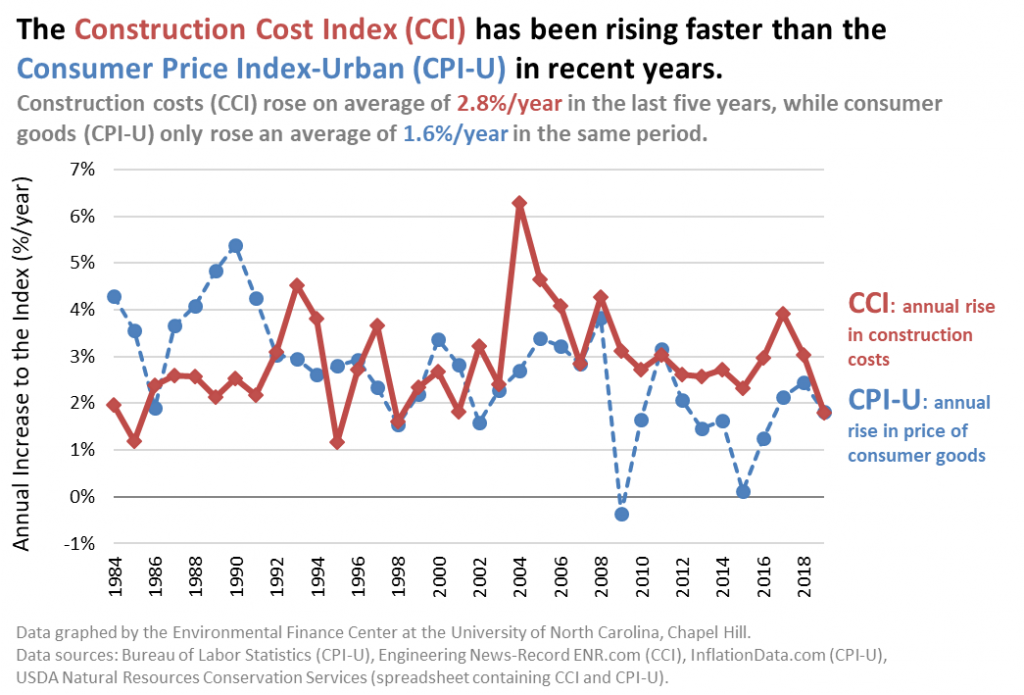
Relative to market values for commercial real estate on a generic basis:
Green Street Commercial Property Price Index
Indexed to 100 in August 2007

All Property CPPI weights: retail (20%), office (17.5%), apartment (15%), health care (15%), industrial (10%), lodging (7.5%), net lease (5%), self storage (5%), manufactured home park (2.5%), and student housing (2.5%). Retail is mall (50%) and strip retail (50%). Core Sector CPPI weights: apartment (25%), industrial (25%), office (25%), and retail (25%). (2)
So what does this all mean for impact on values? It is important to note the distinction between insurable cost values and market values (we have posted to our web-site a previous blog on the distinctions between these two premies of value).
Prior to COVID 19 and the oil price crisis, we would look at some predictive models (as below from Science Direct) that provided trends for construction costs (3):
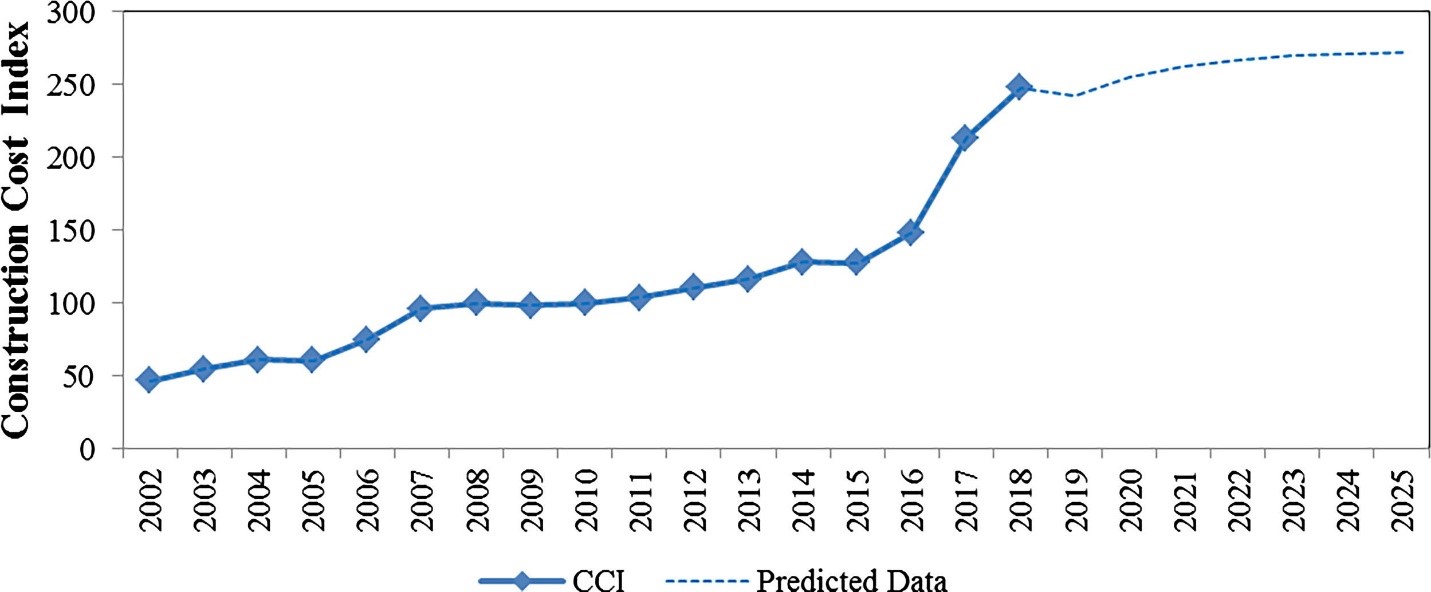
However given the unprecedented nature of the current Black Swan event no one can reasonably predict what the new trends will be, perhaps we will see no change, an increase or sharp drop for both construction costs and market values. However, government intervention may stave off sharp drops or at least shorten the effects of the Black Swan event. Again it is important to note the distinction between insurable cost values and market values, the trends for both are somewhat correlated over time (not perfectly), however in the current environment they could de-couple as governments look to financially support infrastructure projects as economy starters. Furthermore, we could see future insurable cost values and market value trends differ for component type, property type and regions.
Ultimately, we know we are in for periods of volatility (and that the volatility maybe based on geography), particularly until we have a vaccine for COVID 19. Accordingly, the only impact we can predict with some certainty is that we are going to have some volatility, and that we will need to build in some contingencies for this event and for future Black Swan events, time tells us they will occur and this latest event takes us to the extreme in terms of magnitude of impact. As below, some timelines that demonstrate potential impact due to COVID 19.
Timelines of Past Crises in the Stock Markets (4):
| Crisis |
Pre-Crisis Peak |
Market Bottom |
| Great Depression |
August 1929 |
June 1932 |
| Black Monday |
August 1987 |
November 1987 |
| 2000’s Recession |
December 1999 |
September 2002 |
| Great Recession |
October 2007 |
February 2009 |
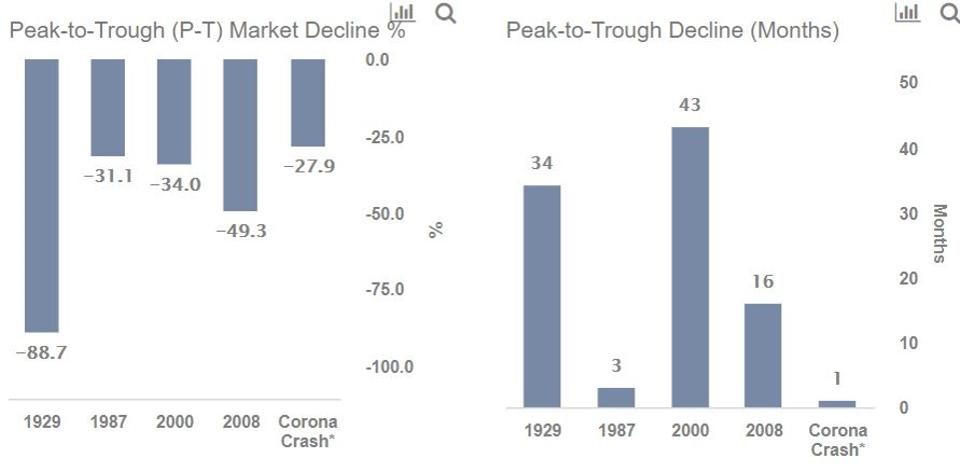
REFERENCES:
Faisal Khan (January 18, 2019). 9 Black Swan Events that changed the Financial World. Retrieved from https://www.datadriveninvestor.com/2019/01/18/9-black-swan-events-that-changed-the-financial-world/
Commercial Property Index. Retrieved from https://www.greenstreetadvisors.com/insights/CPPI.
Construction cost index prediction using neural networks. Retrieved from https://www.sciencedirect.com/science/article/pii/S1110016819300316#f0025
Trefis Team (March 13, 2020). Market Crashes Compared:-28% Coronavirus Crash Vs. 3 Historic Market Crashes. Retrieved from https://www.forbes.com/sites/greatspeculations/2020/03/13/market-crashes-compared28-coronavirus-crash-vs-4-historic-market-crashes/#5112cdd14ee8









